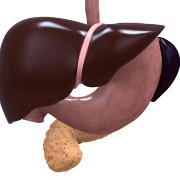 Photo: Getty Images
Photo: Getty Images
Your liver is one of the most important organs in your entire body as it is responsible for detoxification of just about anything you eat, breath, and swallow. It helps with metabolism and provides bile to digest your lipids.
It can make glucose in times of starvation for energy or as fuel for the muscles when your body perceives a ‘flight or fight’ moment, it breaks down insulin and hormones, creates cholesterol and some of your clotting factors, and can store certain vitamins for use at a later date.
The human body cannot survive without its liver therefore it is vitally important you take care of this special organ.
One particular liver disease is called NASH, or non-alcoholic steatohepatitis, which creates fat, inflammation and/or damage to the cells from (as the title implies) non-alcoholic reasons. People with NASH may not have any symptoms or they may have generalized fatigue and weakness, pain or tenderness in the right upper quadrant of their abdomen, swelling in the abdomen, hands, feet and ankles, or changes in their stool.
As it is often considered a silent liver disease, your health care provider may find it on routine blood work when the liver enzymes alanine aminotransferase (ALT) or aspartate aminotransferase (AST) become elevated.
The next step is a liver ultrasound. If lifestyle modifications fail and the ALT (liver enzyme) remains elevated, then a liver biopsy is needed to confirm NASH.
The cause of NASH is not entirely understood. However, more commonly people are overweight or obese, with elevated cholesterol and triglyceride numbers and are either diabetic or pre-diabetic.
Remember that normal cholesterol is under 200 mg/dL, triglycerides are optimal under 100 mg/dL, and glucose (blood sugar) should be 99 mg/dL or less.
Once diagnosed, treatment involves a number of lifestyle changes to improve the quality of your liver and its function. Even though NASH is the non-alcoholic form, alcohol still puts a strain on the liver and therefore it’s recommended to stop drinking or severely limit the number of beverages to not worsen the situation.
Work really hard to lose fat, especially around the abdominal mid-section and get that cholesterol and glucose into healthy ranges. Re-evaluate your meal plans to include a lot more protein, vegetables, fiber and low-glycemic fruits while eliminating sugars (real or fake) and simple carbohydrates (like white rice, noodles, crackers, bagels, and sugary cereals or granola bars).
Lastly, skip out on unnecessary medications and hormone replacement as they directly impact the function of your liver.
References:
1) Nonalcoholic Steatohepatitis
http://digestive.niddk.nih.gov/ddiseases/pubs/nash
2) Nonalcoholic Fatty Liver Disease in Severely Obese Subjects
http://www.medscape.com/viewarticle/552675
3) Nonalcoholic Steatohepatitis: Risk Factors and Diagnosis
http://www.medscape.com/viewarticle/731163
Reviewed September 23, 2011
by MIchele Blacksberg RN
Edited by Jody Smith




Add a Comment1 Comments
Thanks for the advice. I have adopted the 'eat right for your blood type' whereby for me I am to avoid breads and dairy. The main culprits for almost everyone. I eat the advised 'ezekiel' breads and drink soy milk and take a calcium supplement. What I am up against is I have crohns and ulcerative colitis and am on numerous medications that are now affecting the my organs. Noted recent urine sample had high wbc and rbc count in urine. I also noticed on two finger nails, halfmoon white shapes on the nail part, noting possible issues with kidney/liver. What I need to find out is foods that can help the organs get better even thru time to just help them from disaster.
October 31, 2011 - 8:40pmThis Comment